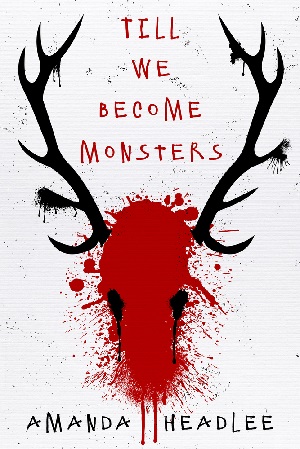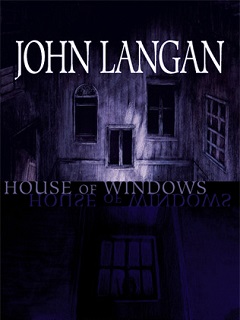A sibling rivalry plays out in brutal and shocking fashion in Amanda Headlee’s debut horror novel Till We Become Monsters. This book is a fun, brisk read that combines some classic horror mythology with a psychological thriller. The primary protagonist is Korin Perrin, but don’t think you can take everything he thinks for granted. You’ll find out quickly that he’s an extremely unreliable narrator. As the story unfolds, you’ll be surprised by abrupt changes in the narrative’s direction.
Spoilers Below

When the tale opens, Korin is a small boy learning about changeling mythology from his grandmother. In European folklore, a changeling was a fairy that had been left in place of a stolen baby. This leads Korin to conclude that his grumpy older brother, Davis, may in fact be a fairy in disguise. Korin’s belief only grows stronger when Davis seemingly pushes their grandmother down the stairs. Things get wild after this as Korin shoves Davis into a fire, only to discover Davis isn’t a fairy. Korin is then shipped off to a mental asylum, where he’s poorly treated. Years pass and Korin recovers to become a successful student while his brother Davis becomes a malcontent with a burned arm who won’t leave home. The siblings take a camping trip into the woods with their father and family friends, but things go horribly wrong. Korin ends up confronting the mythology of the Wendigo, an evil spirit that provokes cannibalism, which turns out to be realer than that of the changeling.
The unexpected shifts were my favorite part of reading this novel. When you start to feel like you’ve got a good handle on how the book will progress, Headlee pulls the rug out from under you. First, I assumed the story would deal with Korin trying to expose his changeling brother, then I thought it might concern Korin battling out of a mental asylum to kill his brother, and finally, we find out things from Korin’s mother later in the tale that recontextualize the opening to reframe the protagonist and antagonist of the novel. The shifts kept me on my toes. I recommend checking this out if you think you’ve gotten to the point where you believe you can predict how every narrative will unfold. This book should manage to surprise you a few times. I’m excited to see what Headlee puts out next.




 Dark Blood Comes from the Feet is an excellent debut short story collection. Author Emma J. Gibbon fills her book with an eclectic and fun mix of tales. Horror fans will find a diverse group of subgenres represented within the pages and will be delighted to encounter Body Horror, Vampires, Witches, Haunted Houses, Urban Legends, Monsters, and more. Each tale is short but leaves a memorable impression. I tried to make a list of my favorite stories in this book and realized I’d nearly written down the entire table of contents. When I paired that first list down, I was left with St. Scholastica’s Home for Children of the Sea, Black Shuck Tavern, Cellar Door, The Tale of Bobby Red Eyes, Janine, and This is Not the Glutton Club, but what your favorites are will depend on what horror subgenres you prefer. The prose is also wonderful throughout, and I had an effortless time moving through this book. I can’t wait to see what Gibbon does next.
Dark Blood Comes from the Feet is an excellent debut short story collection. Author Emma J. Gibbon fills her book with an eclectic and fun mix of tales. Horror fans will find a diverse group of subgenres represented within the pages and will be delighted to encounter Body Horror, Vampires, Witches, Haunted Houses, Urban Legends, Monsters, and more. Each tale is short but leaves a memorable impression. I tried to make a list of my favorite stories in this book and realized I’d nearly written down the entire table of contents. When I paired that first list down, I was left with St. Scholastica’s Home for Children of the Sea, Black Shuck Tavern, Cellar Door, The Tale of Bobby Red Eyes, Janine, and This is Not the Glutton Club, but what your favorites are will depend on what horror subgenres you prefer. The prose is also wonderful throughout, and I had an effortless time moving through this book. I can’t wait to see what Gibbon does next. While House of Windows seems like a haunted house story at first glance, it’s actually more of a haunted father story. The novel’s primary conflict stems from a curse that Veronica’s husband, Roger, places on his son, Ted. Roger places the curse on Ted after the two get into a physical fight over the fact that Roger left Ted’s mother to marry Veronica, his college student. Due to Ted’s death soon after the curse, Roger is unable to reconcile with his son, and Veronica is soon haunted by visions and reminders of Ted, figuratively and literally. Ted’s death breaks Roger, and to try to be closer to his lost son, Roger decides to move him and Veronica into the home where he raised Ted, Belvedere House. Once in Belvedere House, Roger becomes increasingly obsessed with his lost son’s death, and Ted’s haunting of Veronica gets progressively more intense until the novel’s climax, where Roger disappears during a supernatural event. There’s a lot I’m leaving out, but that’s the bare-bones summary of the book.
While House of Windows seems like a haunted house story at first glance, it’s actually more of a haunted father story. The novel’s primary conflict stems from a curse that Veronica’s husband, Roger, places on his son, Ted. Roger places the curse on Ted after the two get into a physical fight over the fact that Roger left Ted’s mother to marry Veronica, his college student. Due to Ted’s death soon after the curse, Roger is unable to reconcile with his son, and Veronica is soon haunted by visions and reminders of Ted, figuratively and literally. Ted’s death breaks Roger, and to try to be closer to his lost son, Roger decides to move him and Veronica into the home where he raised Ted, Belvedere House. Once in Belvedere House, Roger becomes increasingly obsessed with his lost son’s death, and Ted’s haunting of Veronica gets progressively more intense until the novel’s climax, where Roger disappears during a supernatural event. There’s a lot I’m leaving out, but that’s the bare-bones summary of the book.




